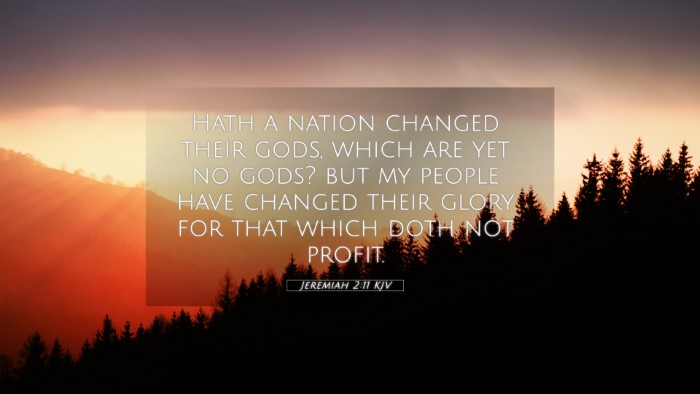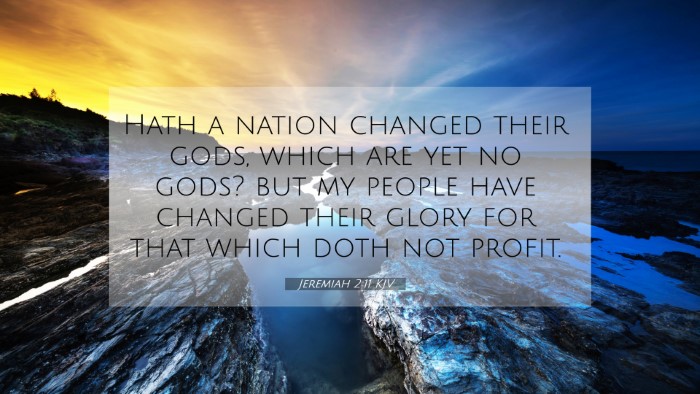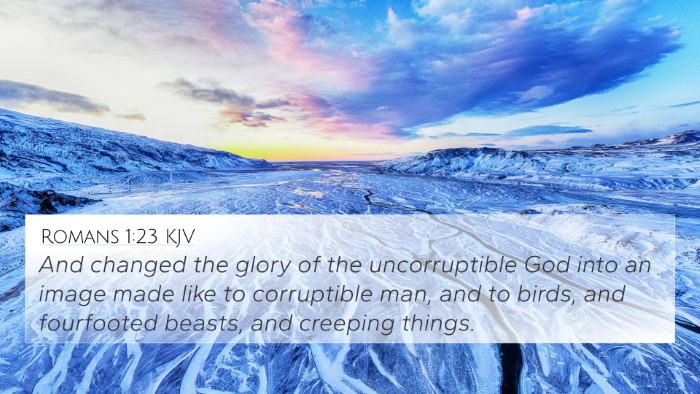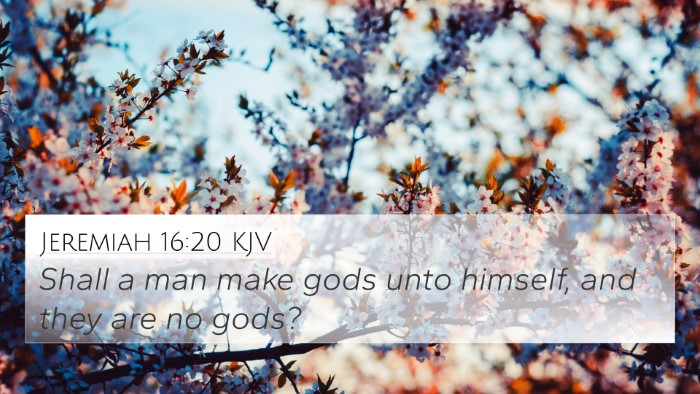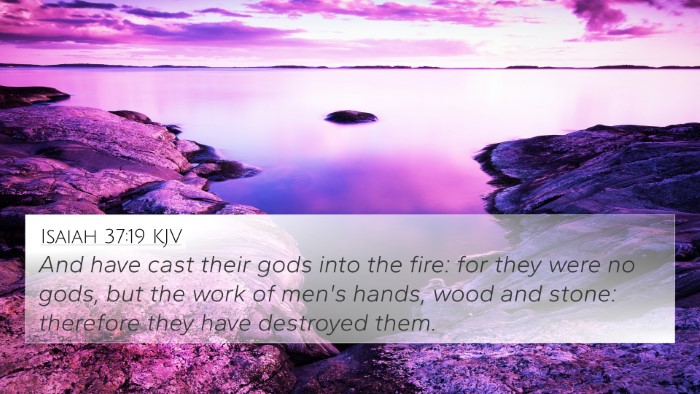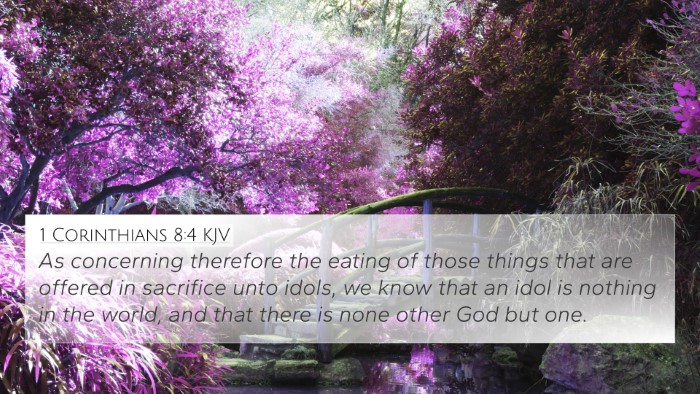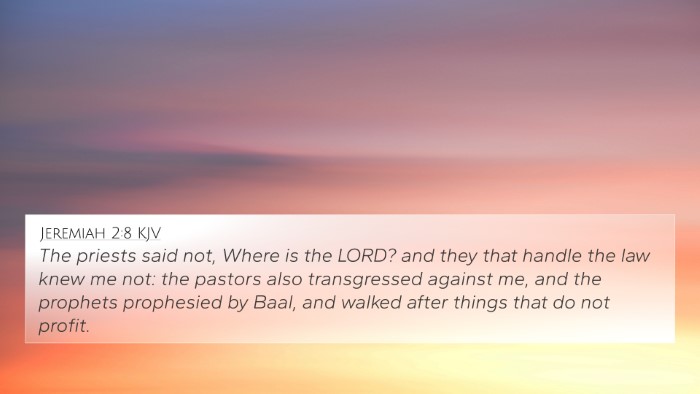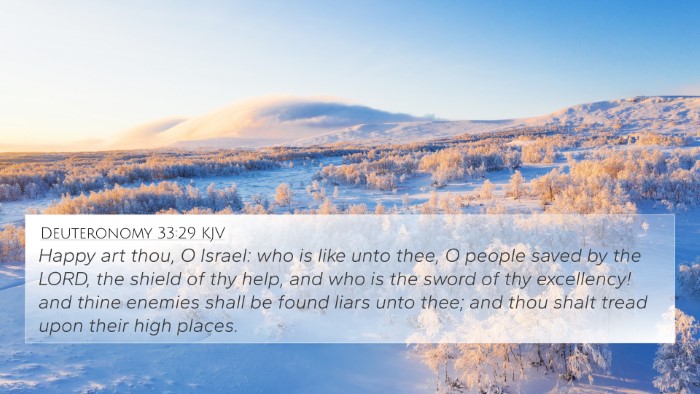Understanding Jeremiah 2:11
Jeremiah 2:11 states, "Hath a nation changed their gods, which are yet no gods? but my people have changed their glory for that which doth not profit."
This verse highlights an important theme in the Scriptures: the contrast between the faithfulness of other nations to their deities, despite their emptiness, and the infidelity of Israel to the true God who has revealed Himself and shown His glory.
Verse Meaning and Implications
Jeremiah, as a prophet, communicates God's frustration with Israel’s unfaithfulness. Let's break down the verse with insights from public domain commentaries:
-
Matthew Henry's Commentary:
Henry emphasizes the absurdity of Israel's apostasy. He notes how nations that worship false gods remain loyal to their idols, while Israel, having experienced God's glory and blessings, turns to non-profitable pursuits.
-
Albert Barnes' Notes:
Barnes elaborates on the concept of "changing gods" and contrasts the faithfulness of pagan nations with Israel's rebellion. He argues it is shocking that Israel would forsake the living God for worthless idols.
-
Adam Clarke's Commentary:
Clarke points out that this expression of unfaithfulness illustrates a deeper spiritual problem within Israel. He discusses the concept of glory, signifying the honor and presence of God that Israel has traded for vanity.
Key Themes
- Idolatry: The verse critiques not only physical idols but also the spiritual inclination to replace God with trivial pursuits.
- The Nature of God: It reminds believers of God’s unchanging character, contrasting it with mankind's fickleness.
- Divine Glory: The significance of God's glory is central; trading it for emptiness leads to spiritual desolation.
Cross-References
Jeremiah 2:11 can be further understood through various Bible verses that provide thematic connections and insights:
- Exodus 20:3: "Thou shalt have no other gods before me." - Reminding Israel of their covenant commitment to God.
- Isaiah 44:9-20: This passage discusses the futility of idol-making and the irrationality of worshipping created objects.
- 1 Kings 18:21: Elijah challenges the people, "How long halt ye between two opinions?" emphasizing loyalty to God over false gods.
- Romans 1:21-23: Paul discusses how humanity exchanged the glory of God for corrupted images, echoing Jeremiah's lament.
- Psalm 106:20: "Thus they changed their glory into the similitude of an ox that eateth grass." This reflects the same idea of exchanging divine glory for mere creations.
- Hosea 8:4: "They have set up kings, but not by me: they have made princes, and I knew it not." This illustrates Israel's rejection of God's authority.
- Hebrews 13:8: "Jesus Christ the same yesterday, and to day, and for ever." Reinforcing God's unchanging nature compared to human inconsistency.
Inter-Biblical Connections
This verse not only stands alone but also invites a comparative analysis with other scriptures:
-
Connections between Bible verses: This verse presents natural parallels with passages that discuss Israel's repeated unfaithfulness, making it a vital component of studying the broader narrative of God's covenant with His people.
-
Bible verse parallels: By examining Jeremiah's statements alongside New Testament warnings against idolatry, one can discern a consistent theme about the dangers of turning away from God.
-
Thematic Bible verse connections: The recurring call to faithfulness throughout the Scriptures from Genesis to Revelation emphasizes that true profit and glory lie only in a relationship with God.
Tools for Bible Cross-Referencing
For those interested in further exploring connections within the Scriptures, several tools and methods can be utilized:
- Bible concordance: This tool can help locate specific terms and their occurrences throughout the Bible.
- Bible cross-reference guide: Many study Bibles provide a built-in cross-reference for deeper exploration of related verses.
- Cross-reference Bible study methods: Using thematic approaches or verse-by-verse comparisons can enrich one’s understanding of Bible texts.
Conclusion
Jeremiah 2:11 serves as a poignant reminder of the need for fidelity in our relationship with God. Engaging with this verse through various commentaries, thematic connections, and cross-references enhances our comprehension and underscores the timeless truth of the Scriptures that call us back to the heart of worship.

